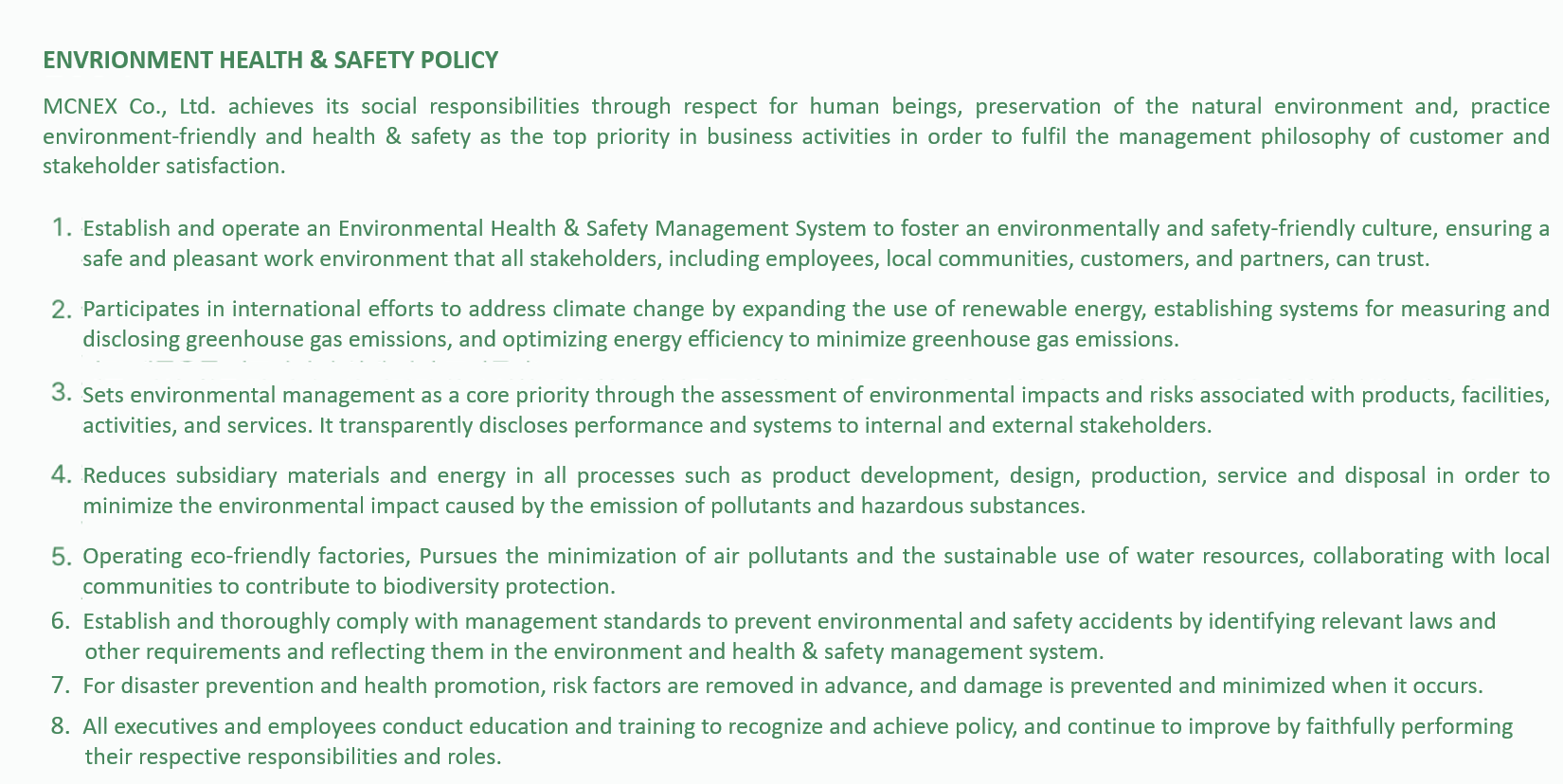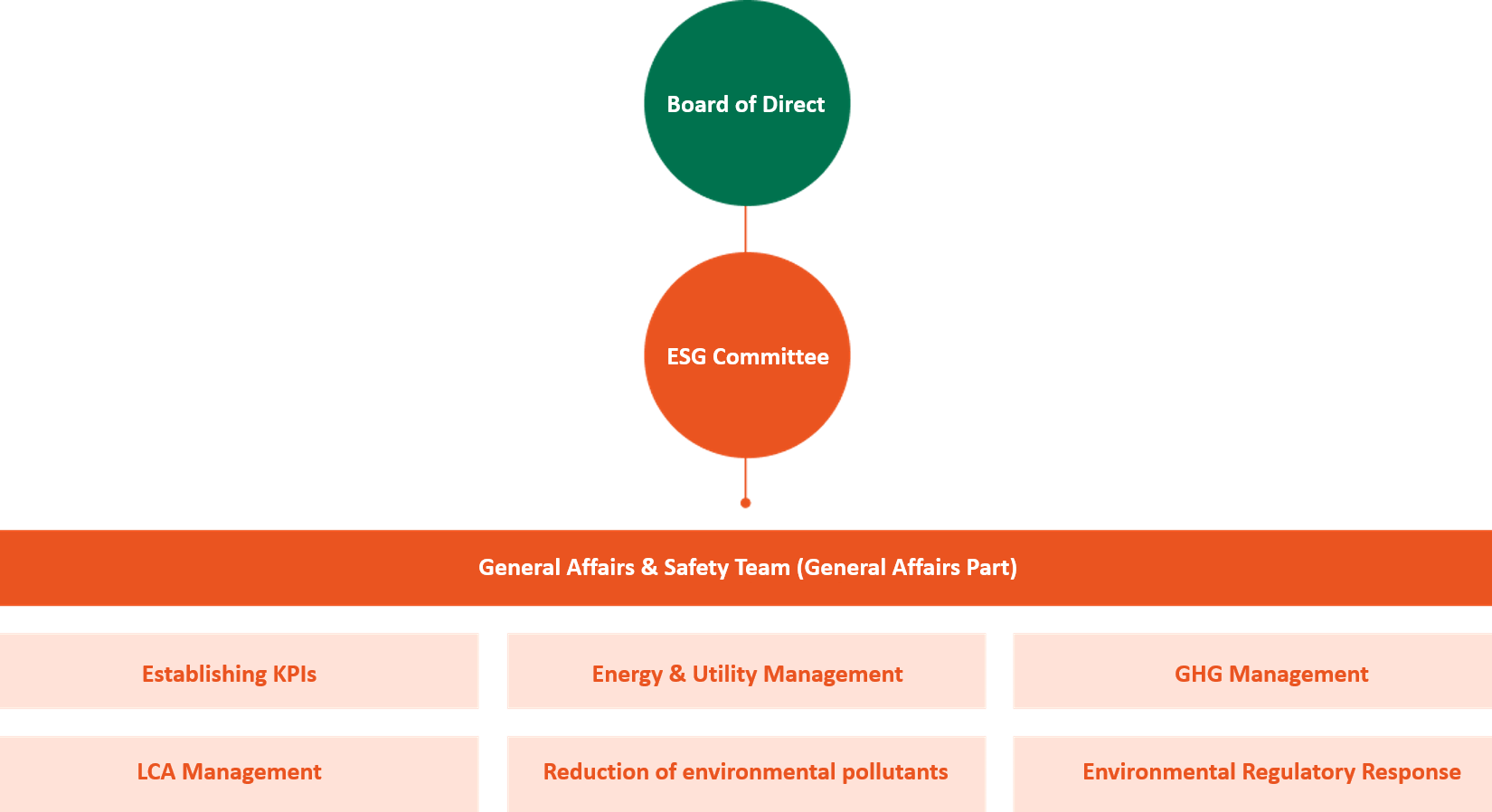
Environmental Management
Environmental Management Implementation System
MCNEX has established an Environmental, Health, and Safety (EHS) policy and operates an environmental management implementation system to carry out its environmental management practices. The company runs a company-wide environmental management system, having acquired ISO 14001 certification for its Incheon Songdo headquarters and its Vietnam manufacturing subsidiary. MCNEX also manages KPIs for key environmental performance areas, including greenhouse gases, energy, waste, and water resources. Furthermore, its EHS policy encompasses energy consumption and greenhouse gas emissions, the management of air and water pollutants, and resource conservation, as MCNEX strives to minimize the negative environmental impacts that may arise from its business activities.

Environmental Management System
MCNEX has established a PDCA (Plan-Do-Check-Action) cycle based on its Environmental Management System (ISO 14001) to manage environmental impacts in key areas such as climate change, energy, waste, and water usage, and accordingly sets environmental goals and plans. For the goals, MCNEX monitors their implementation status through semi-annual performance reviews. In case of non-conformities, it formulates corrective actions and recurrence prevention measures, continuously improving its processes. In particular, MCNEX has set Net-Zero climate change goals and is actively participating in achieving carbon neutrality targets.

Environmental Management Organization
MCNEX established its ESG Committee in 2025. This committee reviews the status and performance of environmental management activities (such as greenhouse gas reduction, renewable energy transition, and Life Cycle Assessment - LCA) and discusses key decisions related to climate change. The formulation and implementation of strategies for company-wide environmental management activities are handled by the General Affairs Part of the General Affairs & Safety Team. This part, in close collaboration with relevant departments on each environmental task, is also enhancing the environmental management execution system.

Environmental Management Activities
Environmental Compliance Monitoring
As global ESG-related regulations—such as the Framework Act on Carbon Neutrality (Korea), the Carbon Border Adjustment Mechanism (CBAM), and Supply Chain Due Diligence Guidelines(CSDDD)—are being established, MCNEX strives to comply with all relevant environmental laws and regulations. The company identifies laws and regulations that could affect its operations, including the Waste Management Act, the Chemicals Control Act, the Framework Act on Carbon Neutrality, and the Act on the Promotion of Saving and Recycling of Resources. MCNEX then manages its environmental compliance by internally assessing its adherence to these legal and regulatory requirements.
Environmental Impact Assessment
MCNEX conducts an Environmental Impact Assessment every three years to evaluate the environmental impacts and risks of its production activities, processes, facilities, and services, and to make improvements. The assessment evaluates aspects such as air quality, water quality, waste, soil, energy, raw and subsidiary materials, and human health (including noise, vibration, and odor), and analyzes their environmental impacts and legal compliance status across past, present, and future timeframes. Furthermore, by conducting environmental impact assessments that cover product manufacturing, handling, storage, shipment, use, and disposal, as well as general business activities, MCNEX strives to minimize significant environmental impacts and risk factors arising from its corporate operations.
Environmental Education
MCNEX sets annual KPIs for each environmental sector and monitors them monthly. Additionally, MCNEX conducts activities, including environmental education, to enhance employees' environmental awareness. In the environmental education conducted in 2024, 463 employees from the domestic headquarters participated, recording a 95.5% participation rate. At the Vietnam subsidiary, all 3,921 employees took part, confirming the high level of interest in ESG among Mcnex employees.
